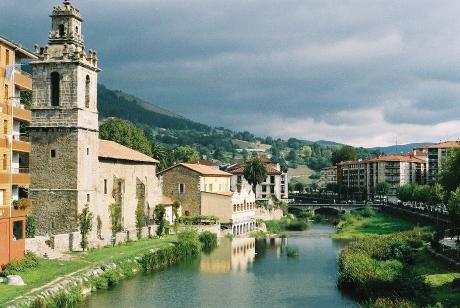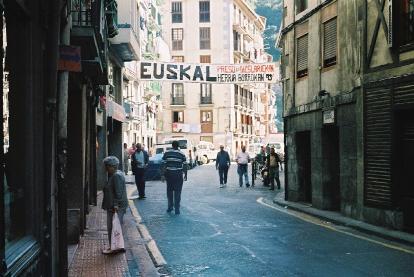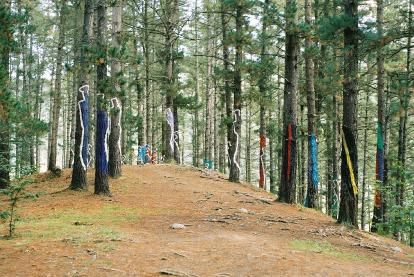





|
Hasiera · Home |
|
Ezaugarriak · Features |
|
Oharrak · Notes |
|
Sarrera · Introduction |
|
Euskara |
|
Folklore |
|
Kirolak · Sports |
|
Musika · Music |
|
Janedanak · Gastronomy |
|
Tokiak · Places |
|
Historia · History |
|
Politika · Politics |
|
Diaspora |
|
Internet |
|
Albisteak · News |
|
Nahas Mahas · Misc |

For security reasons, user contributed notes have been disabled.
by David Cox
| David Cox is employed as a writer and editor and lives in Ontario, Canada. David also contributes review articles to the U.S -based internet publications rambles.net and rootsworld.com, where he writes about European world-roots music, specializing in the music of Euskal Herria and Cymru-Wales. His hobbies include studying the Basque and Welsh languages and playing Euskopoli with his children. |
We live in Toronto, Canada, where there are few Basques. We don't have any Basque heritage. But something about the Basque Country, the people, and the culture, struck a chord with us - we decided to do a three week holiday in Euskadi.
With the two children, we decided to find a good, reasonable Bilbao hotel, and make day trips around Euskadi. We also decided not to do car rental. With public transit so affordable and efficient, why bother?
Bilbao's a great city, lots of character; nestled in among the green hills, always a mountain to be seen over every cityscape. And the Ria is a great place to stroll, run, view sculpture, whatever. Tired? Just hop on the tranbia, it goes everywhere: from the San Mames soccer stadium, to the Euskalduna, past the Guggenheim, to the Zazpi Kaleak.
There are sculptures to look at, a great park for the children to play at outside the Guggenheim, another outside the Bellas Artes; a beautiful crane named Karola; and of course the huge floral puppy! Listen carefully in the parks: All the children call their parents 'ama' and 'aita'. And many people are speaking Euskara to their children.
There is nothing like going for a run long on the Ria. No cars to contend with and, occasionally, a pleasant surprise. One time, someone had speakers set up and was blasting Benito Lertxundi's new album "Zergatik utzi kantatzeari" on the bridge by the Ayuntamiento.
Izozki, bai!
 Food can be a problem. While we share their distaste for "fast food" and
"take-out," Bilbainos do seem to eat at very rigidly defined times. North
American kids eat when they are hungry. But Bronwen, 5, learned quickly that
izozkia or helado was readily available. And the older folks seemed to
always have a candy or two to give to any children who happen to pass by.
Food can be a problem. While we share their distaste for "fast food" and
"take-out," Bilbainos do seem to eat at very rigidly defined times. North
American kids eat when they are hungry. But Bronwen, 5, learned quickly that
izozkia or helado was readily available. And the older folks seemed to
always have a candy or two to give to any children who happen to pass by.
On one occasion, near the transporter bridge, a man stopped us and started speaking English. He said we simply had to try the alubias at a restaurant in La Arboleda (Trapagaran). We took the funicular up the mountain the next day. The waiter brought out a huge bowl of the famous beans and we gorged ourselves. Just when we thought we were ready to pay the bill, the waiter brought out an enormous plate of meat - sausages and innards. I'll refrain from comment!
In La Arboleda, we also saw the remaining miners' homes, the union offices, the political headquarters and the little village left behind where there was once a thriving mining community. We heard from the locals about how they resisted the dictatorship. The children played in Gabriel Aresti Kalea, named after the Basque socialist poet. Indeed, La Pasionaria, Dolores Ibarruri, grew up in those hills above the port of Bilbao, the left side. We climbed up above the town for a lovely view of the port, while the children picked blackberries.
Looking for Euskera
Well, we figured we were visiting the Basque Country; we should at least try to learn the two official languages. I have tourist Spanish, and some vocabulary in Euskera. What I lack most is a feel for the moving parts of the Basque language; the verbs. I'm not sure how it all fits together. The transitive verbs give me fits. Indirect objects - forget it.
In Bizkaia, there seems to be an invisible line running from about Bakio to Gorbeia, east of which pretty much everyone seems to speak Euskara. West of the line, you have to listen harder for it. But it's still there.
I was able to ask simple directions or order a coffee in Euskera. The range of response was interesting. Some people continued to speak Euskera, some switched into Spanish, which helped a bit, and some switched into English (they couldn't help overhearing us speaking to each other). Some people were generally surprised that an outsider, not of Basque heritage, would bother to learn it. Some just laughed with surprise. In one Bilbao store, the woman was an adult learner, she was happy to practice Basque with us. Some people just kept on speaking in Euskera.
As time went on, Bronwen watched three weeks worth of Marazki Bizidunak (Basque cartoons) on EITB, and the clowns: Txirri, Mirri and Txirribiton. By the end of the trip, she was teaching Basque to her little brother on a bus. Bryn, 2, mastered "ez" "bai" and "kontuz", perhaps the most important words of all.
 In Ondarroa, everyone seemed to be speaking Basque, all the time. An old
fisherman was sitting on a bench, near the beach. He spoke to every
passerby. He started making animal sounds to amuse the children. Eventually,
we wound up singing "Boga Boga" together, though I think he wanted a solo.
In Ondarroa, everyone seemed to be speaking Basque, all the time. An old
fisherman was sitting on a bench, near the beach. He spoke to every
passerby. He started making animal sounds to amuse the children. Eventually,
we wound up singing "Boga Boga" together, though I think he wanted a solo.
The best Basque experience we had was at the Euskal Jaia in Salinas de Anana, or Gesaltza. This was a surprise for the children. We told them we were going to see some salt mines. This was technically true. The bus stops in Salinas right outside a field of thousand-year-old salt pans. What we didn't say was that we were going to see their favorite clowns, "Pirritx eta Porrotx pailazoak" The children's eyes lit up when they saw who was there.
We spoke to people from all over the Basque Country. A woman from Donostia was there with her son and grandson, a toddler. She remembered how her father had been jailed for three years simply for speaking or writing in Basque.
There was also a txalaparta to play, brilliant young trikitilaris, a jumpy castle for the kids, buruhandiak giving away candy.
The climax of the day was a magical performance by the group Oskorri. They were well into a brilliant set of "Desertore" when we had to leave for the last bus out of town. We could still hear the beautiful strains of their folk song, whose title translates as "Impossible to say it in words," as we boarded the bus for Vitoria-Gasteiz.
We saw Porrotx perform again in Vitoria, a few days later, with "Kintxo." The city, Vitoria is kind of a reverse layer cake. The old part, gritty and full of character, sits on a knoll in the centre of the modern city. On top of the hill, the Gasteiz Gaztetxea, where the concert was held, is like a cave. It looks like a house from the outside, except the roof doesn't cover the inside. It might provide a moderate amount of shelter from a very light rainstorm. Fortunately, that night was clear skies.
There were a lot of children and parents packed into that place. It was a bit of a free-for-all. One five year old, jostling for position, walloped another one. Although it was a room full of children, many of the parents smoked and smoked. A bit too loud, crowded and smoky for my liking. Bryn, on the other hand, fell asleep in his Mom's arms.
Obaba
I also had the luxury of seeing the film Obaba, dubbed into Euskera, in a local Bilbao cinema. I understood most of it, since I had read the book so many times, even though there were some characters not in the original novel. There was a small but interested audience; later Obaba was nominated as the Spanish "Oscar" foreign-film selection. It was in the newspapers quite a bit. (I can't really understand why Obaba wasn't filmed in Euskera. Seems to me the book Obabakoak was written in Basque.)
We were planning to go to the Kilometroak, Gipuzkoa's festival to raise money for its ikastolas (Basque schools) But that Sunday morning it rained. We thought that eight-ten hours in the rain might be a bit much for the children, so we went to Elorrio on the bus instead. I asked for "ogi txiki bat" in a bakery and the reply was in English. Another learner, only in reverse: a Basque learning English. Also, waiting out the rain in a little bar in the town square, suddenly, on Sunday Morning, Kepa Junkera's "Bok Espok" came on - a beautiful moment.
 Gernika too became one of our favorite places. We visited the Casa de
Juntas, and walked in the peace park, visited the sacred oak. And Oma's
forest was beautiful, with Ibarrola's ghostly tree-paintings! Gernika is
truly a place of peace, a place of importance for the Basques and for the
world.
Gernika too became one of our favorite places. We visited the Casa de
Juntas, and walked in the peace park, visited the sacred oak. And Oma's
forest was beautiful, with Ibarrola's ghostly tree-paintings! Gernika is
truly a place of peace, a place of importance for the Basques and for the
world.
Euskadi in September is beaches with nobody but locals walking up and down - and tourist attractions with no tourists. And - other than around the Guggenheim - virtually nobody who can speak English. Few American or English newspapers. Now that's a break from reality - a true holiday.
David Cox
|
Please report any problems or suggestions to Blas. Eskerrik asko! |





